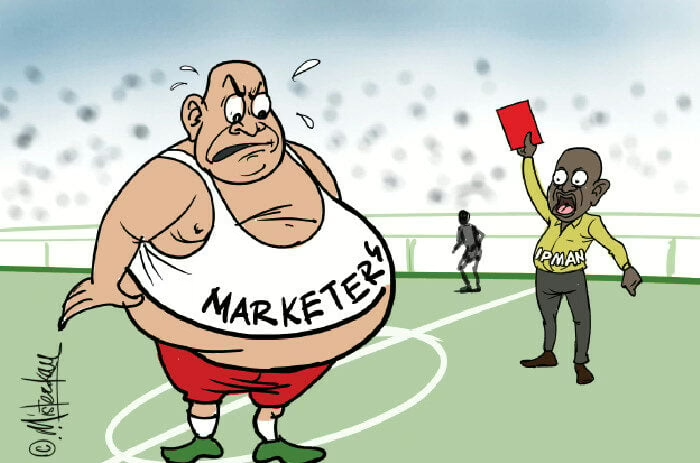May we be spared from the menace of ‘frienemies’-those foes disguised as allies. Consider the middlemen who have long strangled Nigeria’s petroleum distribution sector, yet audaciously claim their actions serve the public interest. Can anything be more absurd?
Previously, I likened their relationship with motorists to this: “You sit heavily on my already burdened back, promising to ease my pain, yet refuse to lift a finger to relieve the weight. This is the hollow assurance Nigeria’s petroleum middlemen have been feeding the public for years.”
The Middlemen’s Grip
These intermediaries, owners of tank farms, articulated tankers, and barges, once dictated fuel prices at the pump. Many were complicit in the massive subsidy fraud that drained Nigeria’s resources. At the peak of this scandal during the Buhari administration, government data-based on dubious subsidy claims-suggested nearly 60 million vehicles were on Nigerian roads. Now, with subsidies abolished, the truth emerges: the actual number is closer to 14 million vehicles, with about 11.8 million privately owned.
Despite the colossal sums lost to fraudulent subsidy claims, no one has faced prosecution. Impunity reigns supreme. The Nigerian National Petroleum Company Limited (NNPCL), meant to be the watchdog, was as culpable as the thieves, united by greed. Who will explain the vanishing act of over 45 million phantom vehicles that supposedly guzzled subsidies?
The rot within NNPCL was especially foul. The agency squandered over $25 billion (approximately 11.35 trillion Naira) attempting to repair the four government-owned refineries, which never delivered satisfactory output. Rumors suggested they could only operate at 40% capacity. The more scrutiny applied, the less progress was evident.
When President Tinubu assumed the role of petroleum minister, industry insiders acknowledged that only presidential authority could rein in the corrupt players. Fortunately, the launch of the Dangote Petroleum Refinery brought much-needed relief.
Dangote’s refinery has the capability to meet Nigeria’s domestic fuel demand and fulfill export obligations. This development was unwelcome to those who profited from imports and subsidy scams. Alongside NNPCL, they erected numerous obstacles to hinder the refinery’s success. The middlemen insisted Dangote focus solely on production, leaving pricing and distribution to them so they could continue inflating costs and lining their pockets.
The Role of NNPCL
At the height of the scandal, NNPCL was importing petrol and distributing it nationwide. Importers openly pressured Alhaji Aliko Dangote to comply with their demands or face business sabotage. They attempted to undermine him through price wars and product quality disputes but ultimately failed.
Many Nigerians were stunned when Dangote Refinery began importing crude oil for refining because NNPCL could not guarantee steady supply. Currently, Dangote spends $650 million monthly importing crude oil to refine locally.
Last year, NNPCL committed 272,500 barrels per day of crude oil through crude-for-loan agreements totaling $8.86 billion, equating to about 8.17 million barrels monthly allocated to loan repayments. This volume starkly contrasts with Nigeria’s total crude production, highlighting a significant shortfall.
There is widespread consensus that crude oil allocation to Dangote Refinery should be prioritized. If Dangote can ensure consistent, affordable fuel supply, it would remove a major barrier to national security and industrial development.
Introducing CNG Trucks
On the logistics front, Dangote Petroleum Refinery has invested over N720 billion to deploy 4,000 Compressed Natural Gas (CNG)-powered trucks for nationwide fuel distribution. This initiative aims to boost energy efficiency and environmental sustainability, potentially saving Nigerians more than N1.7 trillion annually. Independent petroleum marketers, long plagued by supply shortages and high depot fees, now have reason to breathe easier.
The middlemen’s campaign to prevent Dangote from monopolizing distribution collapsed. Ironically, those opposing Dangote’s direct delivery claim to fight monopoly are themselves monopolizing the sector. They demand Dangote relinquish delivery, fearing their 3,000 trucks and thousands of drivers will lose jobs.
Energy analyst Kevin Emmanuel clarified the benefits of Dangote’s trucking model: “Fuel station owners can focus on sales without worrying about fleet management. Simply place your order, make payment, and our trucks will deliver. Entrepreneurs can establish fuel stations without the burden of purchasing trucks, hiring drivers, or managing logistics. Just build your station, order fuel, and we handle delivery.”
Union Challenges and Industry Dynamics
The National Union of Petroleum and Natural Gas Workers (NUPENG) intervened, threatening strikes over claims that Dangote Refinery barred its workers from union membership. Amidst misinformation-likely fueled by middlemen-government mediation reaffirmed workers’ freedom to join or abstain from unions. Yet, within 24 hours, union protests resumed, accusing Dangote of violating the agreement.
NUPENG even disrupted product loading at the refinery, actions disguised as union activism but resembling intimidation tactics.
Commentator Nuhu Aliyu analyzed the stakes: with Dangote Refinery producing 57 million liters of petrol daily plus 104 million liters of other petroleum products, NUPENG risks losing about 4.8 billion Naira if it fails to oppose Dangote. He noted, “For every liter of petrol purchased, N1 goes to these economic saboteurs.”
Conversely, the Independent Petroleum Marketers Association of Nigeria (IPMAN) embraces Dangote’s refinery. Their spokesperson confirmed, “Our direct purchase agreement with Dangote has contributed to falling petrol prices by eliminating middlemen and profiteering.”
Dangote’s CNG initiative is also gaining traction. The Commercial Coordinator of the Presidential Compressed Natural Gas Initiative praised the refinery as a key partner in expanding CNG technology nationwide, especially in haulage and industrial logistics, with plans for regulatory support in vehicle and station rollouts.
With the usual Nigerian hurdles now cleared, citizens can anticipate improved fuel availability and affordability. Former middlemen are challenged to build their own refineries to compete with Dangote’s model.
The era of corrupt manipulation in Nigeria’s petroleum sector is finally coming to an end.

















